Live on the homepage now!
Reader Supported News
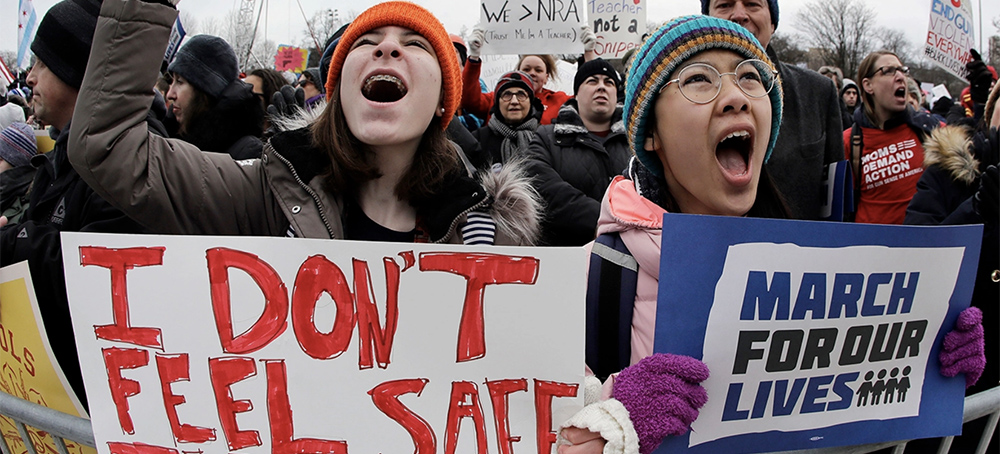 After a mass shooting at Robb Elementary School in Uvalde, Texas, teachers for gun control legislation marched to Sen. Ted Cruz’s office. (photo: Getty Images)
After a mass shooting at Robb Elementary School in Uvalde, Texas, teachers for gun control legislation marched to Sen. Ted Cruz’s office. (photo: Getty Images)
After another school shooting, teachers express fear over the threat of violence in their classrooms.
That day, Elizabeth started locking both doors in her classroom. She told her students not to congregate in the hallway, to stop coming in and out of the room all day long, and “if you have to go to the bathroom, go quick and be back ASAP.”
“I don’t care how inconvenient it is,” she said. “If that fourth grade classroom’s door had been locked, the shooter would not have been able to get inside. I have to remember that.”
Elizabeth, who asked to be referred to by her middle name because “it’s a highly politicized issue ... especially in Texas, and I don’t want to put myself at risk,” did all this because she felt ultimately responsible for her students’ safety. “This is by no means normal and anything I want to be doing with my students, but I felt it was the reality of that day, and I did what felt the safest,” she said.
Previous mass shootings, like the 2012 one at Sandy Hook Elementary in Newtown, Connecticut, that claimed 27 lives, haven’t pushed lawmakers to prevent future ones. The country remains awash with guns, and few new burdens have been placed on would-be gun owners to stop future massacres. Instead, the burden of keeping students safe has fallen on schools — and ultimately on teachers.
In lockdown drills, teachers are expected to train their students to hide, and, in some cases, to fight. Proposals from arming teachers to “hardening schools” underscore the message that keeping schools safe is ultimately the responsibility of schools themselves, and of the adults in them.
“So many of our teachers come to the profession because they love working with children. They love what they do, so they’re already always thinking about how they can help their children. There’s less of a focus on the emotional and traumatic experiences they’re having,” Prerna Arora, a school psychologist and assistant professor of school psychology at Columbia’s Teachers College, told Vox. “We have to consider how trauma impacts a teacher and their ability to be present and be there for their students.”
And if the worst should happen, teachers are often the last line of defense. While police dithered outside, two teachers in Uvalde died while shielding their students from gunfire. Since their deaths, the two teachers, Eva Mireles and Irma Garcia, have been called heroes — a label that does not capture the complexity of what teachers are expected to do and be every day. They’re expected to be counselors, nurses, human shields, and more.
Arnulfo Reyes, a teacher who survived the shooting at Robb Elementary, explained how he went from preparing for a student award ceremony that morning to being shot twice by the gunman and witnessing all 11 of the students in his classroom die. “I tried my best with what I was told to do,” he said in an interview. “It all happened too fast. Training, no training, all kinds of training, nothing gets you ready for this.”
“We have to consider what happens to teachers when part of their job is the expectation that they might have to hug their children under a desk during a mass shooting,” said Arora. “It’s a horrifying visual, the idea of having to shield your students to protect them from gunshots after watching the movie Moana,” Arora said. “This is the only job in the country where someone is basically expected to do this when it’s not part of their job description or what they’re trained for.”
In the days since the shooting, commentators and Texas lawmakers have offered countless thoughts on school shootings, none of which involve gun safety reform. Texas’s Lt. Gov. Dan Patrick and Sen. Ted Cruz suggested that officials “harden schools,” leaving one entrance in and one entrance out. Others have suggested arming teachers, or training students to fight shooters, or making body armor available at schools for students and educators. Other ideas call for a more imposing physical landscape: taller fencing, tripwires, metal detectors.
Many of the ideas, like positioning “good guys with guns” or arming teachers, have not worked in the past. But they underscore that lawmakers are likely to put the responsibility of keeping schools safe back onto schools and teachers.
“As a former volunteer firefighter, I can tell you that many of these ideas to lock down schools create huge safety concerns,” Josh, a science teacher in Houston who asked that only his first name be used for fear of retaliation, told Vox. “They also don’t address the root causes of shootings, which is access to guns and mental health. We don’t have enough counselors in our school and there just isn’t enough money to actually invest in mental health services.”
He added: “We teachers have come under attack for many things this year. They don’t trust us to put out the appropriate books for our students but they trust us to carry guns in schools?”
Rachel Graves Hicks, a high school career and technical education teacher in a large suburban school district near Fort Worth, Texas, has already spent time that could have been spent teaching on preparing for shootings. She routinely practices safety drills with her high schoolers. She tells them to place big items of furniture at the door, get out of sight, and be as quiet as possible. And should the shooter breach the door, she instructs her students to hurl items at them.
The burden could someday become too much. “The day my district determines that teachers are allowed to carry guns at school, I will no longer work in the classroom. Full stop. I am out,” she said. “We tell them to throw monitors and chairs, anything that could stop the shooter,” she said. “How is this not enough?”
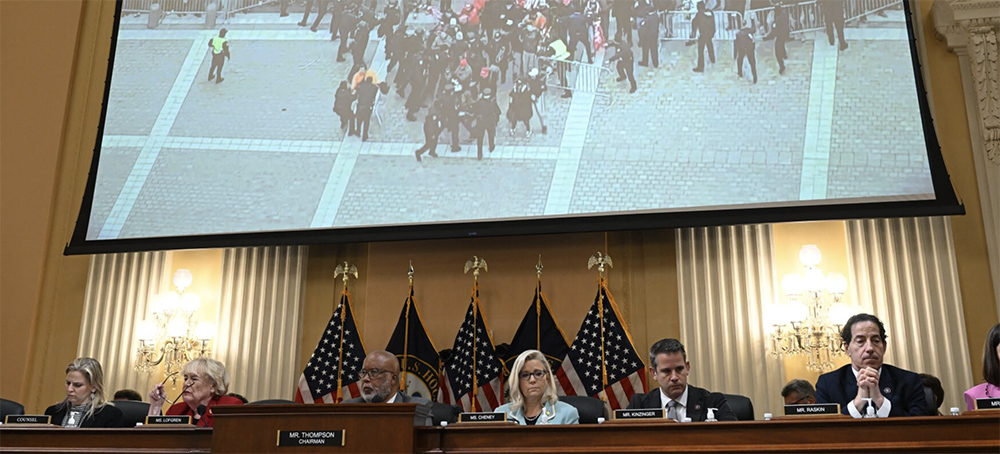 Testimony continued on Monday in the Jan. 6 panel's probe into the attack on the Capitol. Monday's hearing focused on former President Donald Trump's role in perpetuating the lie that the 2020 election was stolen. (photo: Bloomberg/Getty Images)
Testimony continued on Monday in the Jan. 6 panel's probe into the attack on the Capitol. Monday's hearing focused on former President Donald Trump's role in perpetuating the lie that the 2020 election was stolen. (photo: Bloomberg/Getty Images)
In video testimony shown on Monday, former Trump advisers and administration officials said they told Trump that claims of massive voter fraud and a stolen election were false.
The committee showed video of former Attorney General Bill Barr saying that Trump's claims of fraud were "bogus" and "detached from reality," and called claims of Dominion voting machine fraud "idiotic." Former acting Deputy Attorney General Richard Donoghue said he pushed back repeatedly against Trump's allegations of fraud, and told Trump, "much of the info you're getting is false."
BJay Pak, a Trump-appointed former U.S. attorney in Georgia, told the committee he looked into the president and his lawyer Rudy Giuliani's claims of "suitcases of ballots" in Georgia -- and found them to be false, while former City Commissioner of Philadelphia Al Schmidt said he found no evidence of widespread fraud in Philadelphia.
Earlier, President Trump's former campaign manager, Bill Stepien, talked about the hours and days around the 2020 election. Chris Stirewalt, a former Fox News political editor, told the panel that the so-called “red mirage,” in which an apparent Republican lead on election day dissipates because absentee ballots heavily favor Democrats, “happens every time.”
- Catch up: On Thursday, the panel's first hearing laid out its case that Trump was responsible for the deadly insurrection at the Capitol. Panel chair Rep. Bennie Thompson said Trump was at the center of the conspiracy that the 2020 election was stolen from him and he "spurred a mob of domestic enemies of the Constitution to march down to the Capitol and subvert American democracy." Read a recap.
- A third public hearing is scheduled for Wednesday at 10 a.m. ET. Follow the livestream on NPR.org. NPR will also broadcast live special coverage of the hearings. Find your local member station or use the NPR One app to listen.
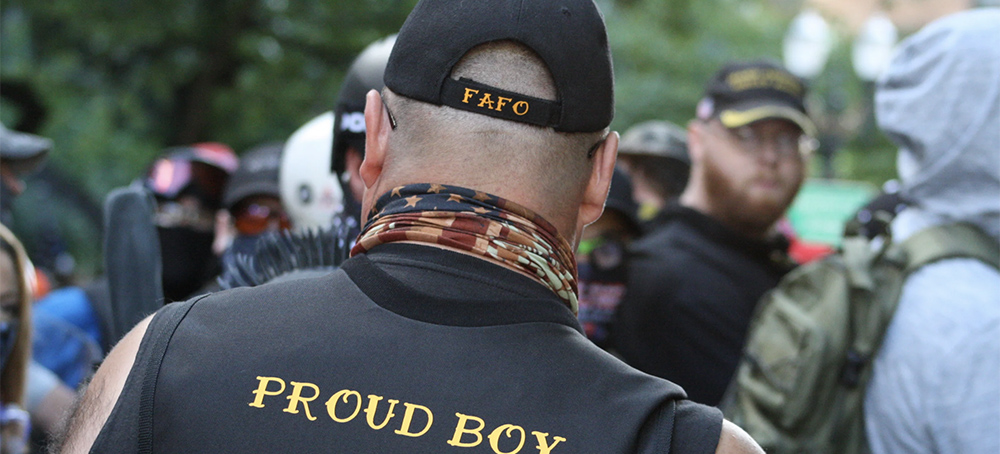 Portland, Oregon/United States-August 22, 2020: Conservative people from the far right movement, Proud Boys, and Boogaloo join for a 'Back the Blue' rally. (photo: Robert P. Alvarez/Shutterstock)
Portland, Oregon/United States-August 22, 2020: Conservative people from the far right movement, Proud Boys, and Boogaloo join for a 'Back the Blue' rally. (photo: Robert P. Alvarez/Shutterstock)
The white supremacist group has graduated from "stop the steal" to "don't say gay."
The event was titled Drag Queen Story Hour and described as just what it seems: drag queens reading stories to children. The event was hosted by Kyle Chu, or drag queen Panda Dulce, and intended to “capture the imagination and play of the gender fluidity of childhood” and allow them to imagine a world “where people can present as they wish.”
Alameda County Sheriff’s Dept. Lt. Ray Kelly said the Proud Boys entered around 1:30 p.m. and deputies responded to the disturbance to identify the men and their affiliation.
More from ABC 7 News:
“The men made homophobic and transphobic remarks against a member of the LGTBQ+ community who was hosting the event,” Kelly wrote in an email.
“We will initiate our hate crime protocol and will also address the annoying and harassing of children. More details to follow,” Kelly wrote. “The men were reported to be members of the Proud Boys organization.”
The sheriff’s department Facebook page says “The men were described as extremely aggressive with a threatening violent demeanor causing people to fear for their safety. Deputies responded to the scene and were able to de-escalate the situation.”
In a video of the incident, the men were seen surrounding the area recording with their phones. One man holds a middle finger up to the camera and says, “Two little girls I support and I love, and I will never allow you to take them away from me. Nope. Not gonna happen. Get it right.” Another man wearing symbol blurred from the video asks the person recording if the cops were called.
Finding an appropriate way to incorporate the youth into Pride Month and LGBT spaces is important. However, the fear of “grooming” and the “gay agenda” continues to restrict the ways they can learn about sexuality and gender.
Panda Dulce is expected to speak more on the incident via ABC 7 News.
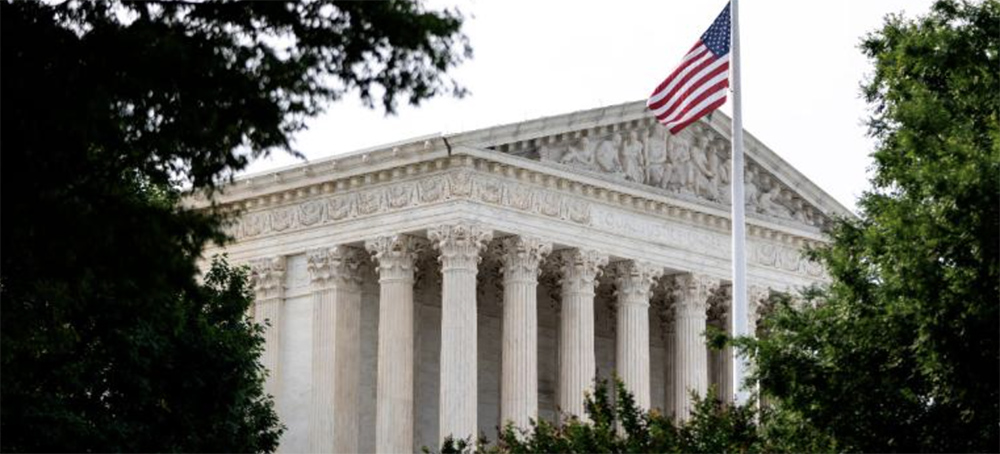 SCOTUS. (photo: Getty Images)
SCOTUS. (photo: Getty Images)
In the 6-3 holding, the court concluded that, under a 1996 statute, lower federal courts lack the power to grant injunctive relief to entire classes of immigrants, as opposed to individual immigrants suing one at a time, that would bar immigration officials from carrying out certain policies.
It's a ruling that could also influence the court's upcoming decision in the so-called "Remain in Mexico" case.
Writing for the majority, Justice Samuel Alito pointed to the language in the relevant laws and said that, taken together, that language "generally prohibits lower courts from entering injunctions that order federal officials to take or to refrain from taking actions to enforce, implement, or otherwise carry out the specified statutory provisions."
Justice Sonia Sotomayor wrote a partial dissent, joined by Justice Elena Kagan and joined in part by Justice Stephen Breyer.
Sotomayor said that the majority opinion "elevates piecemeal dictionary definitions and policy concerns over plain meaning and context."
"I respectfully dissent from the Court's blinkered analysis, which will leave many vulnerable noncitizens unable to protect their rights," she wrote. The three justices, however, noted they thought the government should nevertheless prevail in the case but not for the reasons in the majority opinion.
The challenge, called Garland v. Gonzales, was brought by migrants who brought a class action lawsuit targeting the government's practice of detaining certain immigrations for more than six months. The Supreme Court decided, in a separate case Monday, brought by an individual migrant, that the practice did not violate the relevant immigration law.
In the Gonzales case, the Supreme Court was weighing whether a lower court had overstepped its authority, under the relevant immigration law, in granting the challengers class-wide relief in the lawsuit. The majority said it did, in a holding that will have major repercussions for how other immigration policies can be challenged in federal court in the future.
Alito wrote that the relevant immigration statute "does not preclude a court from entering injunctive relief on behalf of a particular alien" but that "injunctive relief on behalf of an entire class of aliens is not allowed because it is not limited to remedying the unlawful 'application' of the relevant statutes to "an individual alien.'"
Blow to immigrant right advocates
Monday's ruling is a devastating blow to immigrant rights activists who have seen their options for quickly blocking immigration policies they oppose in court severely limited.
"The ramifications of the Court's errors should not be ignored," Sotomayor wrote. "Today's holding risks depriving many vulnerable noncitizens of any meaningful opportunity to protect their rights."
She noted the difficulties immigrants face navigating the "nation's labyrinthine immigration laws," and the "particularly daunting hurdles" migrants face once they're detained.
"It is one matter to expect noncitizens facing these obstacles to defend against their removal in immigration court. It is another entirely to place upon each of them the added burden of contesting systemic violations of their rights through discrete, collateral, federal-court proceeding," Sotomayor wrote.
"In a great many cases, the inevitable consequence of barring classwide injunctive relief will be that those violations will go unremedied, except as to the few fortunate enough to afford competent collateral counsel or to secure vigorous pro bono representation."
Impact on 'Remain in Mexico'
The majority's conclusion in the Gonzales case could come into play in the so-called "Remain in Mexico" case the Supreme Court will be deciding later this term. In that case, Texas and other red states challenged the Biden administration's recission of a controversial Trump-era policy -- known as "Remain in Mexico" -- that forced migrants to stay to Mexico while they waited for immigration proceedings to move forward.
Texas had obtained lower court orders blocking the Biden administration from reversing the policy. Texas 'lawsuit was not filed on behalf of a specific class, but case has also not dealt the removal of an individual migrant. It's possible the Supreme Court in the weeks to come will rule against Texas in the Remain in Mexico case, with decision similar to the one handed down Monday in Gonzales that says that the lower courts did have the authority to hear Texas' case in the first place. After the Supreme Court's oral arguments in the Remain in Mexico case, the justices asked for additional briefing from the parties addressing that procedural question.
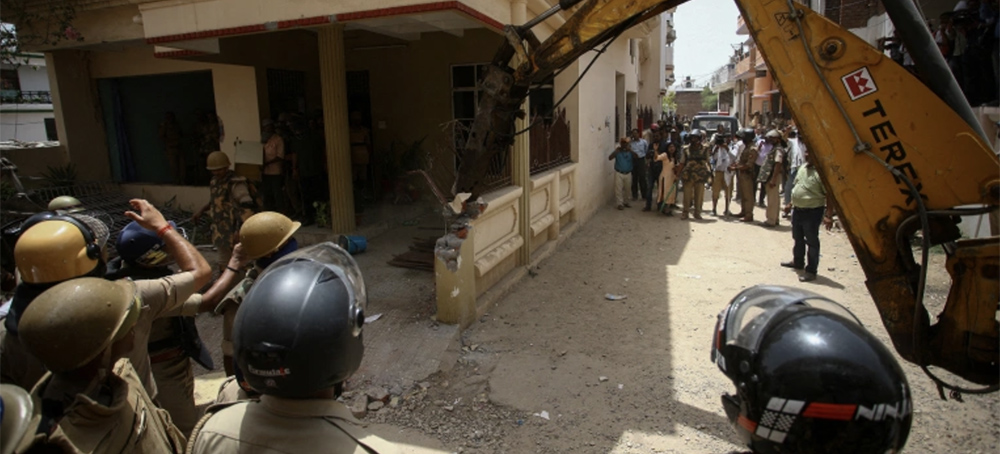 An earthmover demolishes Afreen Fatima's house in Prayagraj in India's Uttar Pradesh state. (photo: Ritesh Shukla/Reuters)
An earthmover demolishes Afreen Fatima's house in Prayagraj in India's Uttar Pradesh state. (photo: Ritesh Shukla/Reuters)
Young Muslim activist’s house demolished after her father is arrested by the police for being alleged ‘mastermind’ of protests over anti-Islam remarks.
Surrounded by a large posse of police in riot gear, authorities in Uttar Pradesh’s Prayagraj city on Sunday brought in earthmovers to demolish Afreen Fatima’s house as dozens of media people recorded the demolition.
Within hours, the two-storey building was reduced to rubble and its belongings – furniture, books and photographs – thrown on an empty plot next to the house. Among them was a poster that said: “When injustice becomes law, resistance becomes duty.”
The demolition came after days of protests by India’s Muslims against the anti-Islam remarks by two members of Prime Minister Narendra Modi’s Bharatiya Janata Party (BJP) earlier this month, triggering a diplomatic backlash against New Delhi.
As several Muslim nations demanded an apology from the Indian government, the Muslims in India saw the remarks by the BJP’s Nupur Sharma and former Delhi media cell head Naveen Kumar Jindal as yet another instance of the right wing’s hate speech against the minority community which has spiked since Modi came to power in 2014.
As global outrage grew, the BJP suspended Sharma and expelled Jindal, saying their comments do not reflect the party’s views and asking its spokespeople to be “extremely cautious” on religious matters while speaking on news channels. Meanwhile, police in the Indian capital filed cases against the two and others for “inciting hatred” and other charges.
But Muslim groups said the moves were not enough and held large protests in several cities after the congregational prayers on Friday, demanding the arrest of the duo. Two teenagers were killed and dozens wounded in the protests. Hundreds of protesters were arrested.
The protests in Prayagraj – earlier known as Allahabad – on Friday following the Muslim congregational prayers turned violent at some places, with police firing tear gas and baton-charging as demonstrators marched and allegedly tried to burn a police vehicle.
A BJP spokesperson said Uttar Pradesh’s Chief Minister Yogi Adityanath, a saffron-robed hardline Hindu monk, ordered officials to demolish any “illegal” establishments and homes of people accused of involvement in the protests.
At least two other houses belonging to Muslims were also demolished in Uttar Pradesh over the weekend.
‘Absolutely illegal’
Fatima’s family was not even home when their 20-year-old house in Prayagraj was torn down.
Hours after Friday protests in the city, police raided the house and took away her 57-year-old father Mohammad Javed, mother Parveen Fatima, 52, and teenager sister Somaiya.
“At around 8:50pm on Friday, police came, saying they want to talk to my father. They asked him to accompany him to the police station. That is it. They did not tell us if it was a detention or if it was an arrest. There was no warrant that was shown,” Fatima, 24, told Al Jazeera TV during an interview on Sunday.
Javed, who is a politician belonging to a Muslim party, was charged with rioting and the police soon declared him the “mastermind” of the protests in Prayagraj – a tag flashed immediately on TV screens across the country.
Parveen and Somaiya were detained by the police and released on Sunday morning. “My mother and my sister were illegally detained for more than 30 hours,” Fatima told Al Jazeera TV.
Fatima rejected the allegations against her father and called the bulldozing of their house an illegal act committed by the authorities.
“The demolition is absolutely illegal because it is not even my father’s property. The house belongs to my mother,” she told Al Jazeera over the telephone.
“We had been paying our house taxes for around 20 years and not once did we receive any intimation by any development authorities of Allahabad that our house is illegal. Why were they even taking our taxes if it was an illegal house?” she told Al Jazeera.
The family shared water bills and house taxation documents to back their claim.
Fatima said the house was demolished without a court of law proving the charges against her father. “Without proving the allegations that my father was a mastermind of protests, which he was not, they punished us,” she told Al Jazeera.
“We were not demonstrating on Friday. None of us were part of the protests that happened in Allahabad. We were at our house, it was a Friday, so we offered our prayers and were in the house all the time,” she said.
Javed’s family has termed his arrest “unjust”, calling him an activist who had been working on civic matters with the Prayagraj administration.
“He would assist the administration on so many civic and law and order matters. So this has come as a shock to us,” Javed’s son Mohammad Umam, 30, told Al Jazeera. “He was not a part of the protest nor did he know who the protesters were or who organised them. The police are making up a fictitious story to implicate my father.”
On Saturday night, city officials pasted a notice on the entrance of their house, calling it an “illegal structure that would be demolished on Sunday”. The notice asked the family to vacate the property before the demolition.
“We saw our house crumble down. We had lived all our lives there. It was our home for 21 years. We had some amazing and defining moments in that home that shaped who I am,” said Fatima. “It is all so painful.”
The family’s lawyers have moved the Allahabad High Court challenging the demolition and demanding a penalty from the state government for the loss of property. Since the court was closed on Sunday, they could challenge the demolition order before it was conducted.
The family’s petition to the high court says Javed was not the legal owner of the house.
“Parveen Fatima was gifted the house by her father before her marriage,” family counsel KK Roy told Al Jazeera. “Under the Muslim Personal Law Property Act, the husband cannot have a share in the property of his wife. Since Javed has no right over the property as per law, the notice in his name is illegal. We have challenged the notice and sought a penalty of at least 10 crore rupees [$1.3m].”
Police justified the demolition, saying they followed the prescribed process. “The allegations are wrong. We applied all the due processes and after that took action,” a police spokesperson told Al Jazeera. A civic official was quoted in the local media as saying the house was an “illegal structure” that was “built without getting its map passed by the Prayagraj Development Authority”.
Glimpse from outside @AfreenFatima136’s house demolition. Your courage is ever giving Afreen. You are a leader. Our hope. Our inspiration. Your voice is an undefeatable weapon. You are us, we are you.
— Nabiya Khan | نبیہ خان (@NabiyaKhan11) June 12, 2022
#StandWithAfreenFatima pic.twitter.com/pXgw3u2mlh
‘Collective punishment’
Fatima called the bulldozing of her house “an act of vendetta against her family”, adding the demolition was part of the policies of the Hindu nationalist government against Muslims exercising their democratic right to protest.
The authorities in Uttar Pradesh bulldozed two other Muslim houses in Saharanpur district over the weekend, while the house of another Muslim in Kanpur city was demolished over the religious riots over remarks against the Prophet.
“Remember, every Friday is followed by a Saturday,” Mrityunjay Kumar, media adviser to Chief Minister Adityanath, tweeted on Saturday with a photo of a bulldozer.
Adityanath is often dubbed “bulldozer baba” (bulldozer monk) by the local media for his policy of demolishing homes of those who protest against the government. Other states have followed suit even as lawyers and activists have questioned the policy’s legality.
The demolition of properties gathered pace in April this year when authorities in neighbouring Madhya Pradesh state – also ruled by the BJP – bulldozed houses and shops belonging to Muslims following religious violence during a Hindu festival.
“Bulldozer has become a signifier of targeted violence against Muslims in India, with demolitions being deployed not as punishment of an individual for violation of law, but as a form of collective punishment that seeks to demoralise and deter anyone who questions the government or their majoritarian politics,” Fawaz Shaheen, a legal activist associated with Students Islamic Organisation of India, told Al Jazeera.
On Sunday, as police and administration began to close in on Fatima’s house, Indian social media was filled with outrage as people expressed their solidarity with Fatima and her family through hashtag #StandwithAfreenFatima.
Social media users questioned the silence of the opposition parties, asking why their leaders and supporters did not protest in Prayagraj to stop the demolition or tweeted about it. Many also asked why the Muslim legislators in the Uttar Pradesh Assembly were not speaking out.
Fatima rose to prominence during nationwide protests led by Muslim groups to demand the repeal of a controversial citizenship law passed by the Modi government in late 2019, which critics said violated India’s secular constitution. The law fast-tracked Indian citizenship for non-Muslim minorities from India’s neighbouring countries who came to India before 2015.
Fatima, associated with a student group called the Fraternity Movement, was elected president of the women’s college students union at the Aligarh Muslim University, India’s largest minority institution based in Uttar Pradesh. She finished her masters in linguistics last year from New Delhi’s Jawaharlal Nehru University, where she was elected councillor in the students’ union.
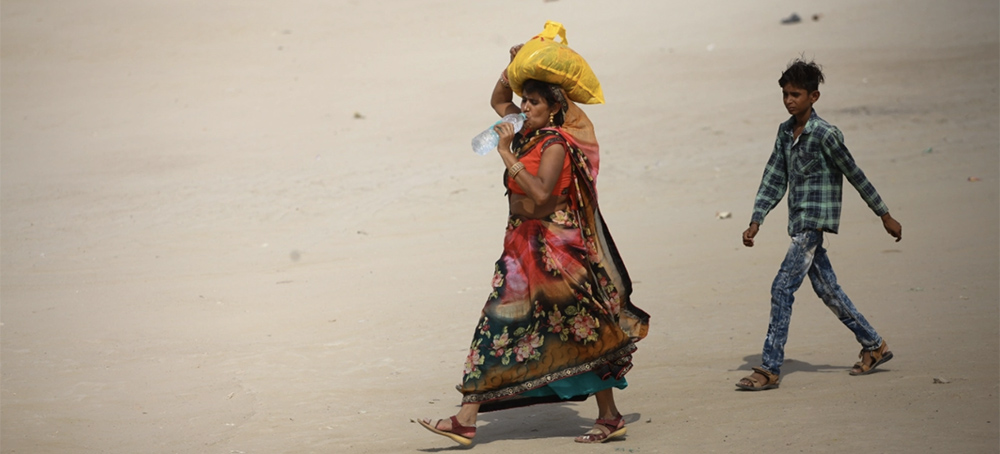 People walk in searing heat in Uttar Pradesh, India, where temperatures soared to 115 degrees F on June 7, 2022. (photo: Ritesh Shukla/NurPhoto/Getty Images)
People walk in searing heat in Uttar Pradesh, India, where temperatures soared to 115 degrees F on June 7, 2022. (photo: Ritesh Shukla/NurPhoto/Getty Images)
Hurricanes, heat, fires, smoke, drought: Is it time to stop sugar-coating summer?
But summer isn’t what it used to be. The season is getting so hot that it might be time for a new name: “danger season.”
The phrase, part of a new campaign by the Union of Concerned Scientists, refers to the period from May to October marked by a drumbeat of disasters in the United States. During these months, people across the country still splash in pools and head to the beach but, increasingly, they also suffer through heat waves, flee from wildfires, breathe smoky air, and board up homes as hurricanes approach.
This summer is predicted to be another menacing one, with forecasts showing hectic hurricanes and above-normal wildfire activity. In a prelude, a heat wave scorched the Southwest over the weekend, breaking records in more than a dozen cities. Temperatures hit 100 degrees F in Denver and reached a blistering 114 degrees at the Phoenix airport.
“Climate change has pushed a lot of these types of events into a new realm that is much more dangerous,” said Kristy Dahl, a climate scientist at the Union of Concerned Scientists. “So as we were thinking about this season, and how we’re going to respond to it, the phrase ‘danger season’ seemed appropriate.”
Consider, for example, that heat kills more people in the U.S. each year, on average, than any other kind of extreme weather, often in predictable ways. Every summer, older adults die in their homes without access to air conditioning, and young athletes die from heatstroke while practicing in searing temperatures. “These sorts of deaths are preventable,” Dahl said. She hopes the framing of “danger season” can better help people grasp summer threats, “because if you understand it, you can start to do something about it.”
That’s not to say Dahl wants to replace the word “summer” or take away your ice cream cones or days at the beach. “You know, we struggled a little bit with feeling like we’re taking away the joy of summer,” she said. It’s possible that a cultural affection for hot weather might make people overlook the season’s dangers — but for some, that sunny attitude is already changing. Where Dahl lives in California, as in much of the western U.S, summer means fires and smoke, and comes with an annual sense of dread. “It feels very different from how I approached the start of summer from when I was younger, which was, ‘It’s warm, let’s have barbecues!’”
The new foreboding name for summer was coined by Erika Spanger-Siegfried, an analyst at the Union of Concerned Scientists. The organization introduced the phrase in a pair of blog posts and on social media last week, and the team plans to keep using the expression as warm-season disasters descend. All 50 states are expected to experience unusually high temperatures this summer, and with extended drought across much of the West, these threats could strain the electric grid and lead to blackouts.
Of course, danger season comes at a different time depending where you live: In the southern hemisphere, summer runs from December to February, when the Australian bushfires can get out of control. No matter where you are, though, warm-weather disasters are creeping into the late spring and early fall, said Rachel Cleetus, a policy director at the Union of Concerned Scientists. Schools without air conditioning are closing for “heat days” more and more often, as they did in Philadelphia in late May, when classroom temperatures topped 100 degrees F.
Plenty of climate threats lurk outside danger season, too. Consider the devastating floods that hit Washington state and British Columbia in November, sending mudslides over highways and forcing thousands to evacuate. What makes summer particularly threatening is the ways that disasters can collide and compound one another. In the Gulf of Mexico, for instance, major hurricanes have knocked out power and water services just as summer heat waves set in. “You suddenly have people who are trying to rebuild their lives, who are doing so in dangerously hot conditions without any access to cooling, to water,” Dahl explained. As extreme heat becomes more frequent and storms get stronger, “it becomes more and more likely that you’re going to get the coincidence of a heat wave and a major hurricane.”
Part of the thinking behind using the phrase “danger season” is to make it harder for people to sugar-coat the climate crisis. “I just want to say straight-up, frankly, 10, 15 years ago, when we would talk about these things, we didn’t want to scare people,” Cleetus said. “We wanted people to understand the science and really be invited into understanding the implications. And now we’re scared, we’re terrified, for what we have already unleashed on the world.”
Edward Maibach, the director of George Mason’s Center for Climate Change Communication, said that “danger season” struck him as a useful framing to help people realize they need to prepare for recurring disasters instead of reacting to them. “Knowing that danger seasons are getting longer will, hopefully, help people, businesses, and governments recognize the need to take actions now to protect the things they value and depend on,” Maibach wrote in an email to Grist.
Dahl called for a “national resilience strategy” that would coordinate efforts to help communities weather disasters and put policies in place to protect people. That means building codes in the West that require buffer space around homes to reduce fire danger, and national heat protection and smoke protection standards for outdoor workers. “There’s a lot that can be done locally,” she said, “but we also need to be thinking at a much bigger scale.”
Follow us on facebook and twitter!
PO Box 2043 / Citrus Heights, CA 95611



No comments:
Post a Comment
Note: Only a member of this blog may post a comment.